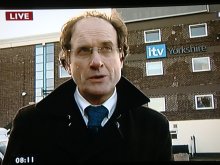ITV confirms plans to shed 600 jobs
ITV has once again thrown its staff into turmoil with today’s announcement that it plans to shed more than 600 jobs.

Gerry Morrissey on BBC News today.
BECTU has called upon Ofcom and Andy Burnham, Secretary of State for the Department of Culture Media and Sport, to step in to stop further damage being done to programme making capacity at ITV.
BECTU members at ITV Yorkshire face the loss of 150 jobs at their site as the company plans to move substantial levels of production away from Leeds to save money.
The union has pledged to do everything possible to support staff through the consultations with management.
ITV staff who want to back BECTU and its team in the detailed work to come and take advantage of the union’s support should join BECTU.
“The company cannot expect to hold on to any enduring and consistent reputation for quality output.”
Programme staff working on Emmerdale and Heartbeat, two of the company’s most successful shows, and the much praised, Countdown, which is produced for Channel 4, face the prospect of cuts and the break-up of existing teams.
In London, staff at Grays Inn Road and on the Southbank are being briefed on how today’s announcement will affect them. Full details have yet to emerge.
The union has not held back in its criticism of the company’s senior management who, BECTU believes, are largely responsible for the current state of affairs.
Short-term thinking, inadequate investment in programme-making and an obsession with regulation has substituted for the clear commitment to content which is vital if ITV’s fortunes are to be revived.
The company’s senior management led by executive chairman, Michael Grade, has continued where former head, Charles Allen, left off.

Paul Atkinson on BBC News today.
Thousands of jobs have been cut since the single ITV company was launched in 2003.
Regional news has far less range than it once did due to savage cuts; and factual, arts and children’s programming, previously standard bearers for the network’s output, are increasingly difficult to find in the schedule.
BECTU’s General Secretary, Gerry Morrissey, had been putting the case for ITV staff to the media throughout today.
Paul Atkinson, BECTU’s National Official responsible for ITV’s Northern licences, has also been relaying the sense of betrayal which staff in Leeds are feeling.
Yesterday’s press release in response to a leak of today’s announcement has been followed today by the press release set out below.
ITV job cuts: ITV’s management must take responsibility
BECTU, the media and entertainment union with rights to represent the largest group of ITV staff, has today urged ITV management to take responsibility for their part in ITV’s continuing difficulties.
BECTU believes that ITV management, which today announced more than 600 job losses, must not hide behind the recession in its explanation for the company’s current troubles.
The job cuts will have a critical affect on the company’s operations in Leeds and London. Further details are being briefed to staff today.
“The biggest headlines which ITV has made in recent years relate to its efforts to ditch its public service responsibilities and the scandal caused by its mismanagement of phone voting,” commented BECTU’s General Secretary, Gerry Morrissey.
“Since the single ITV company was created in 2003 we have seen thousands of jobs lost in regional news, factual, children’s and arts programmes across the country.
“The company cannot expect to hold on to any enduring and consistent reputation for quality output - and remember that is what advertisers are willing to pay for - when the programme making heart of the company is being attacked from within,” Gerry Morrissey said.
ITV’s management is too focussed on pleasing the shareholder and too little focussed on investing in programme-making, according to BECTU.
The union is also challenging the company to show leadership by shedding its outdated approach to executive reward by stopping the system which continues to reward executives for failure.
In Michael Grade’s first year as executive chairman, when the share price dropped by a fifth, he received £1.93 million. Michael Grade left the BBC for ITV in 2006 for a salary package worth £8 million over three years.
“We must end this vicious circle: ITV pleads that it is over-regulated, Ofcom gives in and allows the company to shed public service responsibilities; staff and freelance jobs are lost.
“The reality is the more ITV claims that its operations are being constrained, and the more Ofcom concedes, the less well the company performs,” said BECTU.
“We are in danger here of losing still more programme-making capacity which will never be replaced. The union will do whatever it can to protect the interests of its members and of staff generally. Surely the time has come when Ofcom and the Secretary of State are prepared to step in to stop the rot which is being caused in large part by poor leadership of the company,” concluded BECTU.
Ends
For more information contact Sharon Elliott, BECTU Communications Officer on 020 7346 0900.
Wednesday 4 March 2009
